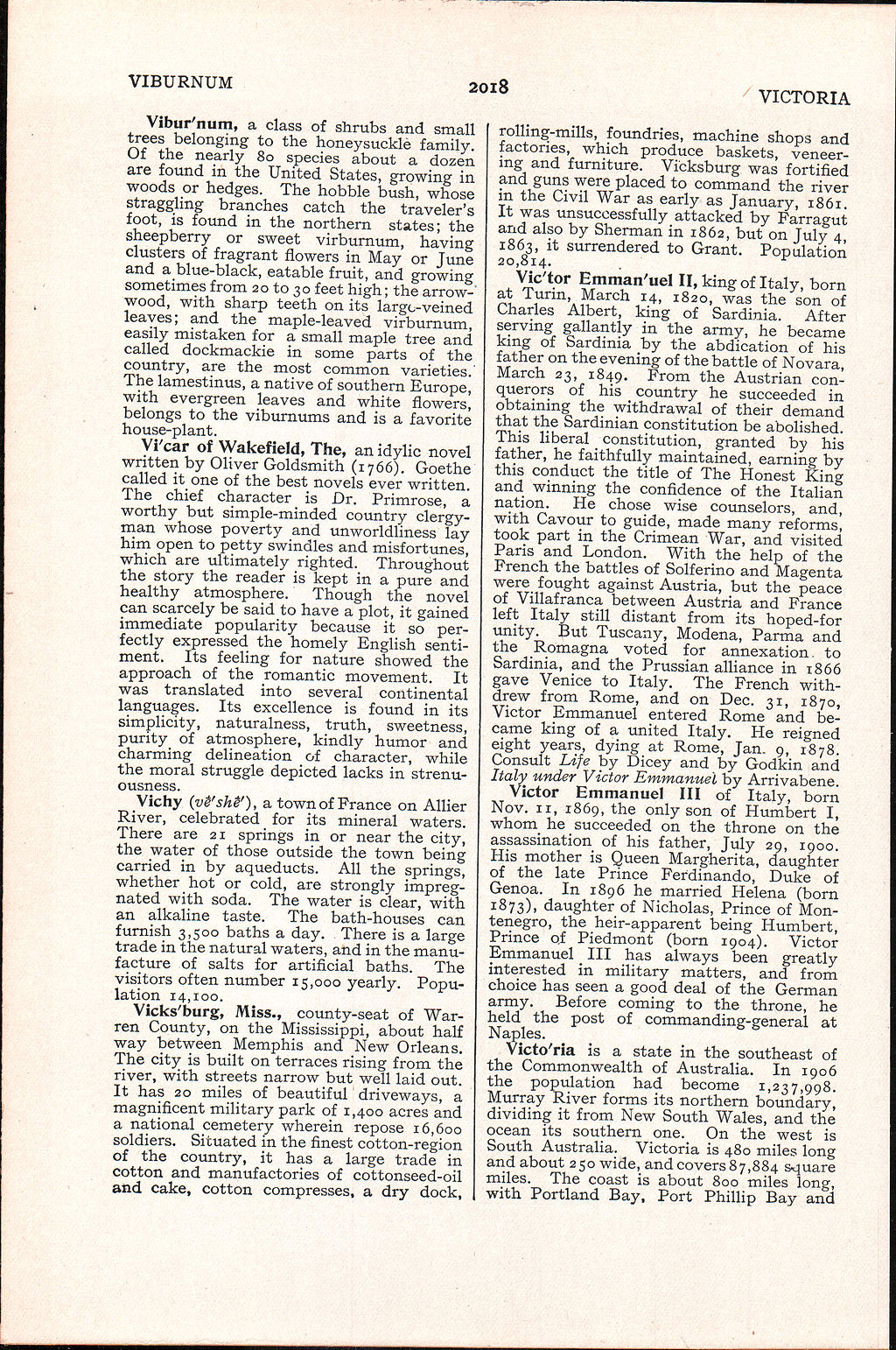Vibur′num, a class of shrubs and small trees belonging to the honeysuckle family. Of the nearly 80 species about a dozen are found in the United States, growing in woods or hedges. The hobble bush, whose straggling branches catch the traveler's foot, is found in the northern states; the sheepberry or sweet virburnum, having clusters of fragrant flowers in May or June and a blue-black, eatable fruit, and growing sometimes from 20 to 30 feet high; the arrow-wood, with sharp teeth on its large-veined leaves; and the maple-leaved virburnum, easily mistaken for a small maple tree and called dockmackie in some parts of the country, are the most common varieties. The lamestinus, a native of southern Europe, with evergreen leaves and white flowers, belongs to the viburnums and is a favorite house-plant.
Vi′car of Wakefield, The, an idylic novel written by Oliver Goldsmith (1766). Goethe called it one of the best novels ever written. The chief character is Dr. Primrose, a worthy but simple-minded country clergyman whose poverty and unworldliness lay him open to petty swindles and misfortunes, which are ultimately righted. Throughout the story the reader is kept in a pure and healthy atmosphere. Though the novel can scarcely be said to have a plot, it gained immediate popularity because it so perfectly expressed the homely English sentiment. Its feeling for nature showed the approach of the romantic movement. It was translated into several continental languages. Its excellence is found in its simplicity, naturalness, truth, sweetness, purity of atmosphere, kindly humor and charming delineation of character, while the moral struggle depicted lacks in strenuousness.
Vichy (vḗ′shḗ′), a town of France on Allier River, celebrated for its mineral waters. There are 21 springs in or near the city, the water of those outside the town being carried in by aqueducts. All the springs, whether hot or cold, are strongly impregnated with soda. The water is clear, with an alkaline taste. The bath-houses can furnish 3,500 baths a day. There is a large trade in the natural waters, and in the manufacture of salts for artificial baths. The visitors often number 15,000 yearly. Population 14,100.
Vicks′burg, Miss., county-seat of Warren County, on the Mississippi, about half way between Memphis and New Orleans. The city is built on terraces rising from the river, with streets narrow but well laid out. It has 20 miles of beautiful driveways, a magnificent military park of 1,400 acres and a national cemetery wherein repose 16,600 soldiers. Situated in the finest cotton-region of the country, it has a large trade in cotton and manufactories of cottonseed-oil and cake, cotton compresses, a dry dock, rolling-mills, foundries, machine shops and factories, which produce baskets, veneering and furniture. Vicksburg was fortified and guns were placed to command the river in the Civil War as early as January, 1861. It was unsuccessfully attacked by Farragut and also by Sherman in 1862, but on July 4, 1863, it surrendered to Grant. Population 20,814.
Vic′tor Emman′uel II, king of Italy, born at Turin, March 14, 1820, was the son of Charles Albert, king of Sardinia. After serving gallantly in the army, he became king of Sardinia by the abdication of his father on the evening of the battle of Novara, March 23, 1849. From the Austrian conquerors of his country he succeeded in obtaining the withdrawal of their demand that the Sardinian constitution be abolished. This liberal constitution, granted by his father, he faithfully maintained, earning by this conduct the title of The Honest King and winning the confidence of the Italian nation. He chose wise counselors, and, with Cavour to guide, made many reforms, took part in the Crimean War, and visited Paris and London. With the help of the French the battles of Solferino and Magenta were fought against Austria, but the peace of Villafranca between Austria and France left Italy still distant from its hoped-for unity. But Tuscany, Modena, Parma and the Romagna voted for annexation to Sardinia, and the Prussian alliance in 1866 gave Venice to Italy. The French withdrew from Rome, and on Dec. 31, 1870, Victor Emmanuel entered Rome and became king of a united Italy. He reigned eight years, dying at Rome, Jan. 9, 1878. Consult Life by Dicey and by Godkin and Italy under Victor Emmanuel by Arrivabene.
Victor Emmanuel III of Italy, born Nov. 11, 1869, the only son of Humbert I, whom he succeeded on the throne on the assassination of his father, July 29, 1900. His mother is Queen Margherita, daughter of the late Prince Ferdinando, Duke of Genoa. In 1896 he married Helena (born 1873), daughter of Nicholas, Prince of Montenegro, the heir-apparent being Humbert, Prince of Piedmont (born 1904). Victor Emmanuel III has always been greatly interested in military matters, and from choice has seen a good deal of the German army. Before coming to the throne, he held the post of commanding-general at Naples.
Victo′ria is a state in the southeast of the Commonwealth of Australia. In 1906 the population had become 1,237,998. Murray River forms its northern boundary, dividing it from New South Wales, and the ocean its southern one. On the west is South Australia. Victoria is 480 miles long and about 250 wide, and covers 87,884 square miles. The coast is about 800 miles long, with Portland Bay, Port Phillip Bay and
